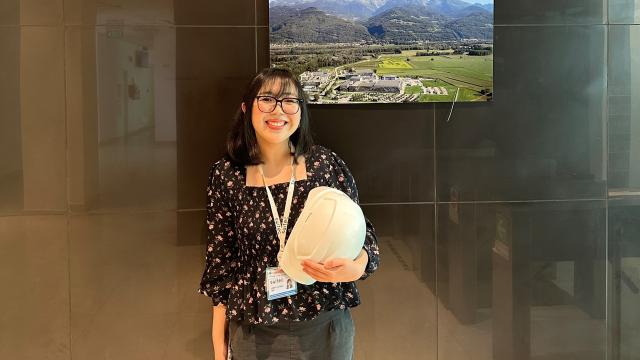The Singapore Institute of Technology introduces a competency-based education model for its Bachelor of Engineering (Honours) in Electrical and Electronic Engineering (EEE) degree programme, and learners can choose to specialise in semiconductor manufacturing.

The first class for Electronic Systems, a micro-credential in the Bachelor of Engineering (Honours) in Electrical and Electronic Engineering programme under the Competency-based Stackable Micro-credential pathway, started in September 2024 for working professionals. (Photo: A/Prof Neelakantam Venkatarayalu)
The global semiconductor market is on track to reach a value of US$1 trillion by 2030, driven by the rapid growth of technologies such as artificial intelligence (AI) and the increasing adoption of electric vehicles. Singapore plays a vital role in this industry, contributing to 10% of global chip production and 20% of the world's semiconductor manufacturing equipment output. With Southeast Asia's semiconductor supply chain expected to expand at an annual rate of 8.84% through 2027, SIT's Bachelor of Engineering (Honours) in Electrical and Electronic Engineering (EEE), offered through the Competency-based Stackable Micro-credential (CSM) pathway, aims to develop more skilled engineers to meet the needs of this dynamic sector. Learners can choose to specialise in semiconductor manufacturing.
SIT is the first university in Singapore to implement the CSM pathway, designed based on the Competency-Based Education (CBE) model. The EEE programme is one such programme delivered via the CSM pathway. CSM equips graduates to be future-ready by introducing micro-credentials — selected, focused learning modules designed to develop industry-relevant skills. These micro-credentials, co-developed with leading industry partners, provide targeted training that aligns with the evolving needs of the workforce. For SIT students, this means gaining hands-on expertise and a competitive edge in high-demand fields like semiconductor technology and energy systems.
Flexible Learning for All
Launched in September 2024 for working professionals, this programme signals a bold step forward, catering to aspiring engineers. By blending flexibility with industry relevance, SIT ensures that its graduates are equipped to meet the evolving needs of Singapore’s critical electronics sector.
Continuing Education and Training (CET) learners, many of whom juggle full-time jobs, can now pursue their degrees over a course of a maximum of six years, at their own pace. With largely asynchronous online lessons, they can learn during lunch breaks, weekends, or whenever their schedules allow. This innovative structure is designed to accommodate the realities of modern work-life demands, without compromising academic rigour.

Participants in the Electronic Systems class collected their take-home kit for their integrated project assignment of prototyping an electronic system. (Photo: A/Prof. Neelakantam Venkatarayalu)
Micro-credentials as a Pathway to a Degree
The CSM pathway enables students to earn micro-credentials that they can accumulate toward earning a degree. The micro-credentials allow learners to focus on acquiring specific, job-relevant skills, covering a comprehensive learning spectrum from foundational principles to advanced specialisations. Each micro-credential culminates in an integrated project that assesses students’ ability to apply their knowledge in real-world contexts. This modular approach offers flexibility and helps equip graduates with wide-ranging and highly relevant skills.
Key competencies taught in these micro-credentials include data analytics, operational excellence, robotics and automation, semiconductor manufacturing and sustainable energy systems. Learners with prior relevant on-the-job experience or qualifications, such as specialist diplomas or certifications earned from SIT’s partner polytechnics or universities, may be exempted from certain competencies under each micro-credential.
Made for the Industry
The programme’s semiconductor manufacturing specialisation is a timely addition given Singapore’s ambitions to strengthen its semiconductor industry. Students who opt for this track will be immersed in the world of semiconductor fabrication and automation, gaining both theoretical knowledge and hands-on experience. The specialisation was designed in consultation with major industry players in the electronics and semiconductor industry, such as STMicroelectronics and Applied Materials. Their input has ensured that the curriculum aligns with the latest technological advancements and workforce needs.
The support from these companies has been instrumental in developing the programme. As Associate Professor Neelakantam Venkatarayalu, Programme Leader for the EEE programme, said, “They help shape the curriculum, and provide opportunities for our learners to hear from industry veterans on real-world insights. Some of the companies, such as STMicroelectronics, Applied Materials, Micron and Kulicke & Soffa have supported their employees to enrol in our CSM pathway to upskill while continuing their careers.”
One adult learner currently in the programme is Ben Xiao, a 68-year-old Senior Engineer at MSV Systems & Services Pte Ltd, who embodies the spirit of lifelong learning. After decades in the field, Ben enrolled in the EEE programme to fulfil his dream of earning an engineering degree. “The flexible nature of the CSM pathway has made it possible for me to realise my lifelong dream of getting an EEE degree. With the new knowledge acquired, I can be a better mentor to my colleagues, too,” he shared.
“The programme provides the exposure for learners to upskill and stay relevant for the long term in the semiconductor industry as the sector evolves,” said A/Prof Venkatarayalu. He pointed out that the degree is more than just an academic qualification; it is for those who are eager to acquire competencies and aspire to elevate their career. “The programme is for those who are passionate about all the electronic gadgets that surround us, who are driven by that passion to be a part of the technology that is driving the evolution of the world around us.”
The EEE programme will be adapted for full-time undergraduate students and made available from September 2025. Find out more about SIT's electrical and electronics degree programmes here.
This article first appeared in VOICE Magazine by SSIA.
![[FA] SIT One SITizen Alumni Initiative_Web banner_1244px x 688px.jpg](/sites/default/files/2024-12/%5BFA%5D%20%20SIT%20One%20SITizen%20Alumni%20Initiative_Web%20banner_1244px%20x%20688px.jpg)


